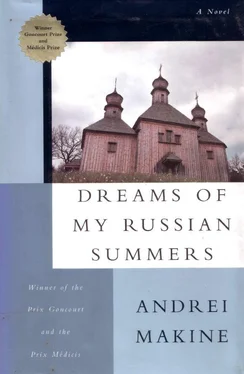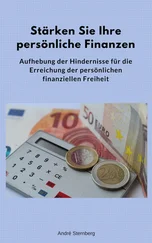On that distant evening, twenty years ago, Charlotte is already getting up, adjusting her hair in the reflection of the open window and we leave. And on my lips, with the pleasant sharpness of the wine, these words, never ventured upon, fade away: "If she is so beautiful still, despite her white hair and having lived so many years, it is because all these moments of light and beauty have been filtered through her eyes, her face, her body…"
Charlotte leaves the station. I follow her, drunk with my un-sayable revelation. And night falls over the steppe. The night that has lasted for twenty years in the Saranza of my childhood.
I saw Charlotte for a few hours ten years later, before I went abroad. I arrived very late in the evening, and I was due to leave again for Moscow early in the morning. It was an icy night at the end of autumn. For Charlotte it brought together the troubled memories of all the departures in her life; all the nights of farewells… We did not sleep. She went to make the tea, and I paced up and down in her apartment, which seemed to me strangely small and very touching, through the constancy of familiar objects.
I was twenty-five. I was ecstatic about my trip. I already knew that I was going away for a long time. Or rather that my visit to Europe would be extended far beyond the planned two weeks. It seemed to me that my departure would shake the calm of our stagnant empire; that its inhabitants would all talk of nothing but my exile; that a new era would begin from my first action, from my first words uttered on the other side of the frontier. I was already living off the procession of new faces I would meet; the dazzle of dreamed-of landscapes; the stimulus of danger.
It was with the conceited egoism of youth that I said to her, in rather jocular tones, "But you could go abroad as well! To France, for example… Wouldn't that tempt you, eh?"
The expression on her face did not change. She simply lowered her eyes. I heard the whistling melody of the kettle, the tinkling of snow crystals against the black windowpane.
"When I went to Siberia in 1922," she finally said to me with a weary smile, "half, or maybe a third of that journey, you know, I made on foot. That was as far as from here to Paris. Do you see, I wouldn't need your airplanes at all…"
She smiled again, looking me in the eye. But despite the tone of voice she assumed, I sensed within her voice a deep note of bitterness. Embarrassed, I took a cigarette and went out onto the balcony…
It was there, above the frozen darkness of the steppe, that I believed I had finally understood what France meant to her.
It was in France that I almost forgot Charlotte's France forever…
Autumn had come, and twenty years now separated me from those times spent in Saranza. I became aware of this interval – of the poignant "twenty years on" – the day our radio station made its last broadcast in Russian. That evening, leaving the newsroom, I pictured an endless expanse yawning between this German city and Russia, asleep under the snows. Henceforth all that nocturnal space, which on the previous evening was still alive with the sound of our voices, would fade, it seemed to me, into the muffled cracking of the empty airwaves… The goal of our dissident, subversive broadcasts had been achieved. The snowbound empire was waking up, opening itself up to the rest of the world. The country would soon change its name, its regime, its history, its frontiers. Another country would be born. We were no longer needed. The station was being closed. My colleagues exchanged artificially noisy and warm farewells and departed, each in his own direction. Some wanted to rebuild their lives on the spot, others to pack their bags and go to America. Yet others, the least realistic, dreamed of a return that would take them back into the blizzard of twenty years ago… Nobody had any illusions. We knew that it was not just a radio station that was disappearing but our era itself. All that we had said, written, thought, fought against, defended, all that we had loved, detested, feared – all those things belonged to that era. We were left with a vacuum, like waxwork figures in a cabinet of curiosities, relics of a defunct empire.
On board the train taking me to Paris I tried to find words to describe all the years spent far away from Saranza. Exile as a mode of existence? Brute necessity of life? A life half lived and mainly wasted? The meaning of those years seemed to me obscure. So I tried to convert them into what men consider to be sound values in life: recollections of dramatic changes of scene ("In those years I have seen the whole world!" I said to myself with childish arrogance); the bodies of women they have loved…
But the recollections remained drab, the bodies strangely inert. Or occasionally they emerged from the dimness of memory with the wild insistence of a shop dummy's eyes.
Those years were nothing more than a long journey for which I managed from time to time to find a goal. I would invent it just as I was leaving a place or already en route; or sometimes on arrival, when I had to explain my presence that day, in one particular town, in one particular country rather than another.
A journey from one nowhere to another, yes. As soon as the place where I was staying began to exert a hold on me, to establish me in its pleasant daily routine, I had to leave at once. My journey knew only two moments: arrival in an unknown town and departure from a town whose facades hardly trembled as I looked at them… When I had arrived in Munich six months before, as I walked out of the railway station, I was already prudently telling myself that I must find a hotel, then an apartment, as close as possible to my new work at the radio…
That morning, in Paris, I had the fleeting illusion of a real return: in a street not far from the station, a street still hardly awake in that misty dawn, I saw an open window and the interior of a room that exuded a simple, everyday, but for me mysterious calmness, with a lamp lit on the table, an old dark wood chest of drawers, a picture on the wall coming slightly unstuck. The warmth of this glimpsed intimacy seemed to me suddenly both ancient and familiar, so much so that I shivered. To climb the stair, knock at the door, recognize a face, be recognized… I hastened to banish this sensation of rediscovery, which struck me then as nothing other than a vagrant's sentimental moment of weakness.
Life was rapidly exhausted. Time stagnated, measurable from now on only by the wearing out of heels on the wet asphalt, the succession of sounds, soon learned by heart, that the drafts carried along the corridors of the hotel from dawn till dusk. The window of my room looked out on an apartment block under demolition. A wall covered with wallpaper stood there amid the rubble. Fixed to this colored surface a mirror, without a frame, reflected the delicate and ephemeral depth of the sky. Each morning I wondered whether I was going to see this reflection again when I drew open my curtains. The daily suspense gave a rhythm to the stagnant time, to which I was becoming more and more accustomed. And even the idea that one day I must quit this life, that I must make a break with what little still bound me to those autumn days, to that city, kill myself, perhaps – even such a notion soon became habitual… And then one morning – when I heard the dry sound of collapsing masonry, and outside the curtains, in the place of the wall, I saw an empty space smoking with dust – the idea seemed to me like a marvelous way of leaving the game.
I remembered it several days later… I was sitting on a bench in the middle of a boulevard soaked in drizzle. Through the numbness of a fever I felt within myself a kind of silent dialogue between a frightened child and a man: the adult, himself troubled, was trying to reassure the child, speaking in a falsely cheerful tone. The encouraging voice told me that I could get up and return to the café; drink another glass of wine and stay out of the cold for an hour. Or go down into the clammy warmth of the Métro. Or even try to spend another night at the hotel without having anything left to pay with. Or if need be, walk into that pharmacy at the corner of the boulevard and sit down on a leather chair, stay still, say nothing, and when people gather round me, whisper very softly, "Leave me in peace for a moment, in this light and this warmth. I will go soon, I promise you…"
Читать дальше












